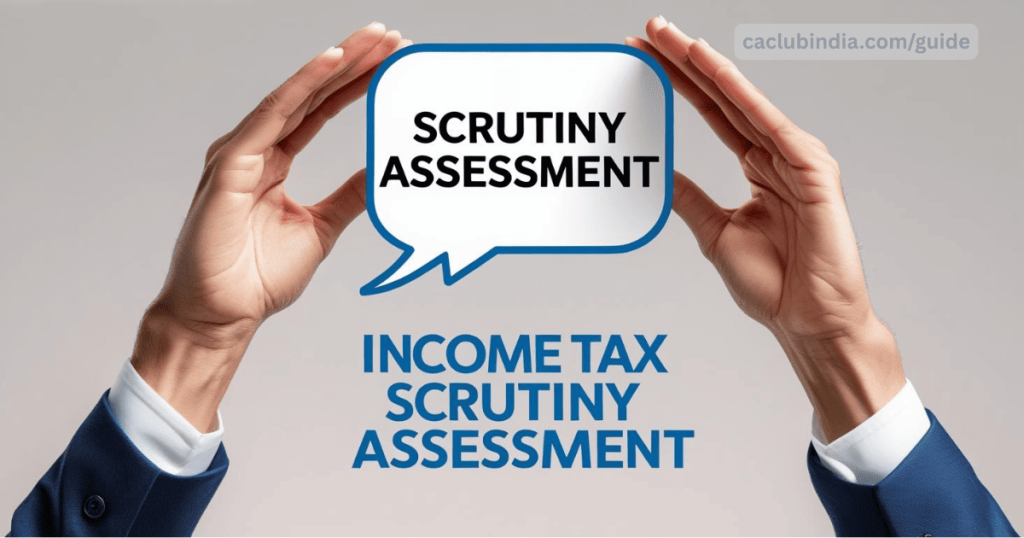The assessment year 2025-26 (AY 2025-26) is expected to bring some of the most substantial changes in taxpayers’ income tax return (ITR) filing. Compared to previous years, the Income Tax Department has introduced multiple updates—including revised ITR forms, modified tax slabs, and new compliance regulations—since the last filing season.
The Central Board of Direct Taxes (CBDT) released new guidelines on June 14, 2025, outlining mandatory scrutiny procedures for Income Tax Returns filed for the financial year 2025-26 (assessment year 2026-27). The Income Tax Department issued these updated norms to streamline the scrutiny process.
The CBDT, in its guidelines (F. No. 225/37/2025/ITA-II dated June 13, 2025), has defined the criteria for mandatory scrutiny of ITRs for FY 2025-26 (AY 2026-27). Key cases selected include:
- Survey cases (conducted after April 1, 2023)
- Search & seizure/requisition cases (up to April 1, 2025)
- Cancelled tax-exempt registrations
- Repeated additions/disallowances in past assessments
- Specific tax evasion intelligence
Cases pertaining to survey u/s 133A of the Income-tax Act,1961 (Act)
Case(s) of the assessee(s), in whose case survey u/s 133A of the Act (other than survey u/s 133A(2A) of the Act) has been conducted on or after 01.04.2023.
Procedures – Cases shall be selected for compulsory scrutiny under this parameter by Directorate of Income-tax (Systems) with the approval of DGIT(Systems ), Delhi on the basis of information of survey cases provided by CIT(Inv)(OSD), Investigation Division, CBDT.
Notice u/s 143(2) of the Act shall be. served on the assessee through the Jurisdictional Assessing Officer or the Prescribed authority.
If these cases are lying outside Central charges, Pr. CIT/ Pr. DIT/ CIT/ DIT concerned shall ensure that such cases are transferred to Central Charges u/s 127 of the Act within 15 days of service of notice u/s 143(2) of the Act.
Cases pertaining to Search & seizure/ requisition on or after 01.04.2023 but before 01.09.2024
Case(s) of the assessee, in whose case Search u/s 132 of the Act was initiated or Requisition u/s 132A of the Act was made, on or after 01.04.2023 but before 01.09.2024.
Search & seizure/ requisition on or after 01.09.2024 but before 01.04 .2025
Case(s) for the Assessment Year 2025-26 of the assessee(ss), in whose case Search (For u/s 132 of the Act was initiated or Requisition u/s 132A of the Act was made, on or after 01.09.2024 but before 01.04.2025
Procedures for point 2 and 3 – The cases shall be selected for compulsory scrutiny with prior administrative approval of Pr. CIT/ Pr. DIT/ CIT/ DIT concerned, who shall ensure that such cases are transferred to Central Charges u/s 127 of the Act within 15 days of service of notice u/s 143(2)/142(1) of the Act by the Jurisdictional Assessing Officer (JAO) concerned.
Cases related to registration/ approval under various sections of the Act. such as 12 A. 12 AB. 35(l)(ii)/ (iia)/(iii), 10(23C)(iv)/(v)!(vi)/(via), etc.
Cases where registration /approval under various sections of the Act such as section 12A, 12AB, 35(1)(ii)/(iia)/(iii), 10(23C)(iv)/(v)/ (vi)/(via), etc.
(i) has not been granted or has been cancelled/withdrawn by the Competent Authority on or before 31.03.2024 , and
(ii) the assessee has been found to be claiming tax-exemption/deduction in the return filed in ITR-7.
However, where such orders of withdrawal of registration/approval have been reversed/set-aside m appellate proceedings, those cases will not be selected under this clause.
Procedure – Cases shall be selected for compulsory scrutiny using this parameter by Directorate of Income-tax (Systems) with the approval of DGIT(Systems ), Delhi on the basis of returns filed by these entities in FY 2024-25.
Notice u/s 143(2) of the Act shall be served on the assessee through NaFAC.
The Jurisdictional Assessing Officers shall upload the underlying documents containing specific information regarding this parameter immediately.
Cases involving addition in an earlier assessment year(s) on a recurring issue of law or fact and/or law and fact:
Where the addition in an earlier assessment year( s) on a recurring issue of law or fact and/or law and fact (including transfer pricing issue) is:
a. exceeding Rs. 50 lakh m eight metro charges at Ahmedabad, Bengaluru, Chennai, Delhi, Hyderabad, Kolkata, Mumbai and Pune;
b. exceeding Rs. 20 1akh in charges other than eight metro charges; and where such an addition:
(i) has become final, as no further appeal has been preferred against the assessment order; or
(ii) has been upheld by the Appellate Authorities in favour of Revenue; even if further appeal of assessee is pending, against such order.
Cases related to specific information regarding tax-evasion: Cases, in respect of which:
(a) specific information pointing out tax-evasion for the relevant assessment year is provided by any law-enforcement agency, (Investigation Wing/ Intelligence/ Regulatory Authority/Agency, etc.) ; and
(b) the return for the relevant assessment year is furnished by the assessee.
Procedure for point 5 and 6 – The Jurisdictional Assessing Officers (JAOs) shall prepare a list of cases falling under this parameter and the same may be submitted for the administrative approval of Pr.CIT/Pr.DIT/CIT/DIT concerned.
The consolidated list of such cases shall be submitted by the Pr.CIT/Pr.DIT/CIT/DIT to the Pr. CCIT concerned.
The Jurisdictional Assessing Officers shall upload the underlying documents containing specific information regarding this parameter immediately.
Exclusions from Mandatory Scrutiny for FY 2025-26 (AY 2026-27)
Returns Filed in Response to Section 142(1) Notices
If a taxpayer files an ITR based on a notice under Section 142(1) and the discrepancy arises from:
- AIS (Annual Information Statement)
- TDS-CPC (TDS Centralised Processing Cell)
- SFT (Statement of Financial Transactions)
Then, mandatory scrutiny guidelines will not apply. Instead, such cases will be processed under CASS (Computer-Assisted Scrutiny Selection).
Limited Third-Party Information in Search Cases
If only limited third-party data is discovered during a search operation, the case will not automatically be referred to the Central Circle.
However, a senior tax officer may still direct further scrutiny if deemed necessary.


